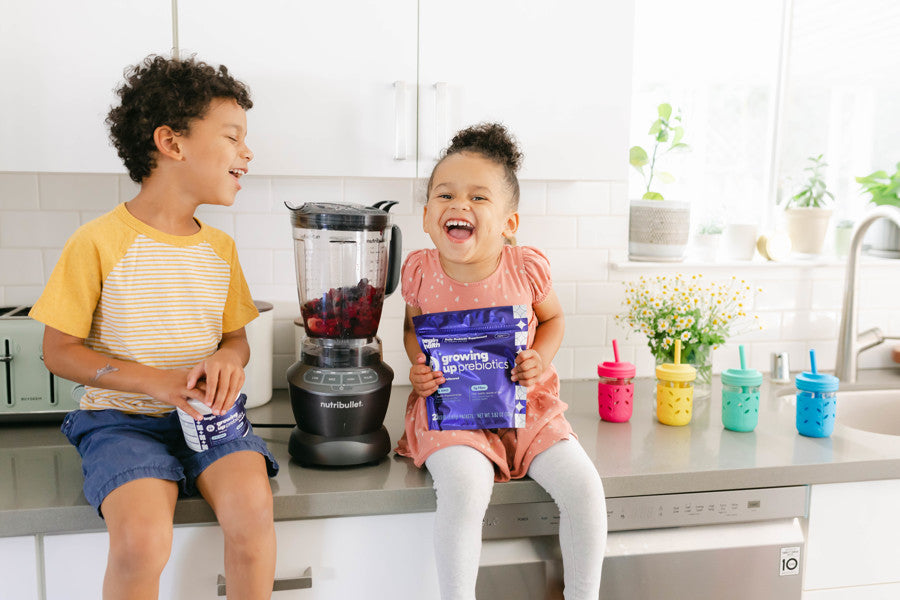Your Cart is Empty
Continue shoppingChronic Constipation, Encopresis And Rectal Prolapse In Kids With Dr. Nattiv, MD, Pediatric Gastroenterologist
Medically reviewed by Dr. Roy Nattiv, MD | Published April 06, 2023
share this article

What does a kids’ “chronic constipation” diagnosis mean?
Parents wait months to see a pediatric gastroenterologist for their kids’ struggles to poop only to be diagnosed with chronic constipation and prescribed laxatives. What does a kids’ “chronic constipation” diagnosis mean? What options do parents have?
Dr. Nattiv's Answer
Chronic constipation - or long-term constipation in children - is defined as pooping less than every other day or having hard or small feces; difficult or painful evacuation of large-diameter stools; or encopresis (voluntary or involuntary evacuation of smears throughout the day) for more than 3-4 weeks.
Unfortunately, chronic constipation has become a widespread problem likely related to poor diet/nutrition with every increasing number of processed snack foods and prolonged screen time.
Another term parents often ask about is “encopresis?” What advice do you have for parents of kids’ experiencing encopresis?
Encopresis or stool incontinence can be quite a challenge for parents. Encopresis is the repeated involuntary passage of stool in the underwear after the acquisition of toileting skills (typically after 3-4 years of age). It is usually a result of chronic constipation and large stool mass in the rectum that has become impossible for the child to pass.
During normal pooping, the stretch of lower intestines sends a signal to the brain that it’s time to poop. In kids with encopresis, the lower intestines has become so full and stretched for such a long period of time that it no longer sends the signal to the brain. At that point the child has lost “the urge” to defecate. Instead, the stool just leaks out. Encopresis usually presents as smears or small stools that leak throughout the day requiring frequent changes of diaper/underwear. It can be quite frustrating for parents and embarrassing for kids because they will often say they can’t feel it coming out.
The treatment of encopresis requires guidance from a pediatric gastroenterologist. It usually involves a disimpaction to get the blockage out using medication. The little one will then need to be on long-term stool softeners (often several months) to allow the intestines to decompress to regain the stretch and sensation or urge to defecate. Once the little one is having soft daily bowel movements without accidents for some time, the laxatives are gradually weaned while introducing more natural stool softeners.
Daily reads to help your little ones lead happier and healthier lives.
Buy Now
Join the
Happy Gut Club
Parents of toddlers or kids with constipation may sometimes suffer from rectal prolapse. What is rectal prolapse and are there any signs that a parent can look out for? How is rectal prolapse diagnosed and can it ever heal?
Rectal prolapse refers to the extrusion of some or all of the rectal mucosa through the external anal sphincter - essentially the rectum flips inside out and protrudes from the anus. It can be quite a horrifying experience for parents! There are two types of rectal prolapse - partial, which is <2cm and complete, which is>2cm or more. There are many conditions which can lead to rectal prolapse - however, chronic constipation has been attributed to rectal prolapse in >50% of cases.
The increased abdominal pressure associated with prolonged toilet sitting and straining can push the lower intestines through a relatively weak pelvic floor musculature. Occasionally, there are causes of rectal prolapse including infections or genetic illnesses like Cystic Fibrosis or Hirschsprung's (which I mentioned previously). Parents with kids that have rectal prolapse might notice a dark red mass at the anal verge with or without mucous.
Oftentimes the prolapse quickly gets sucked back in as soon as the child stops straining. In these cases, kids may report feeling something protruding on wiping or report small blood on the toilet paper. Parents who suspect their child has prolapse may want to have their child sit on the toilet or squat and ask them to strain to see if anything is protruding. That’s why kids with rectal prolapse need to be followed closely by the pediatrician or pediatric gastroenterologist to make sure it resolves.
Parents need to be taught how to manually reduce (or gently push) the rectum back up if it does not do so on its own. The good news is that rectal prolapse will resolve with improved bowel habits - making sure the stools are soft and require minimal straining and shortest amount of time on the toilet. Again, its important to discuss a plan, however, with a pediatrician or pediatric gastroenterologist because complications can arise if rectal prolapse continues for beyond early childhood years.
What advice do you give parents that feel that their doctors or pediatric gastroenterologist isn’t listening to them or doesn’t offer any advice other than prescribing more laxatives? [is this question aimed at providing alternative to traditional laxative or advice on how to activate the pediatrician/specialist]
Parents nowadays are getting pretty savvy. There is a ton of medical literature from trusted sources available to parents online. Parents are connecting on Facebook Groups and other social media platforms to learn from each other’s experiences. When it comes to stool softening, there are plenty of natural strategies available to help wean kids off laxatives. That’s not to say that it isn’t challenging - it can certainly be a challenge and every kid is a bit different.
By educating themselves and learning from the experiences of others, parents can find a strategy that works for their child. This may include a pre- or probiotic or a fiber smoothie recipes with some of the child’s favorite fruits! Parents are always presenting me with new ideas that they discovered online or from their peers. I am not too proud to say that I have learned more than a thing or two parents over the years!
Finally, I always tell parents that if they feel they are not getting the care or attention they feel they need from their pediatrician or specialist - then just switch! There are many doctors out there and oftentimes it's a matter of finding the right fit.
Summary
Chronic constipation, encopresis and rectal prolapse are challenging experiences for children and parents. Parents if you feel frustrated with the care or lack of care from your child’s doctor, find a practitioner who you feel supports your family.

Author
Dr. Roy Nattiv, MD
Trending

How to Transition Kids Off Stool Softeners Safely
read now
How to Know If Your Kid Needs a Stool Softener (or Something Else)
read now
Why Parents Are Choosing Prebiotics Over Stool Softeners for Kids
read now






